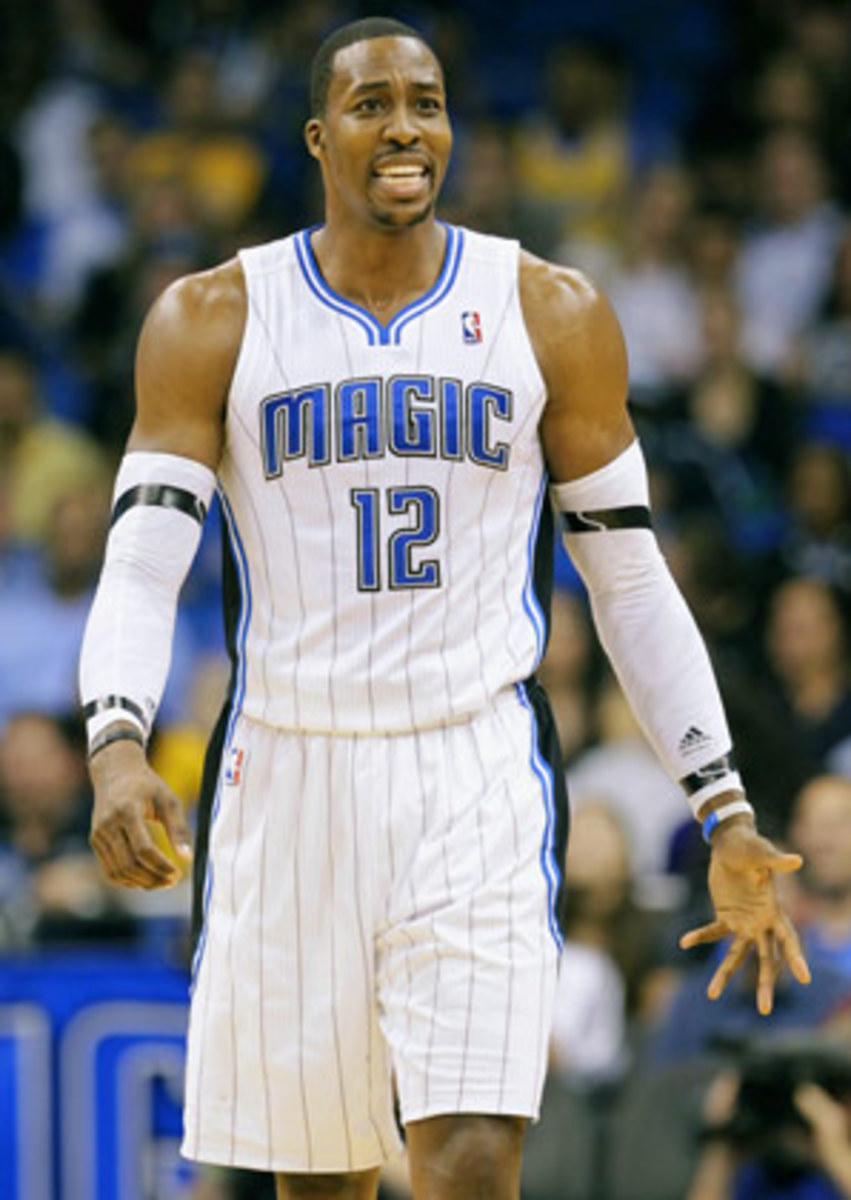Pssst, did you hear the rumor ... ?
There are rumors going around -- literally going around, on the infinite loop of the ticker -- that Magic center Dwight Howard will be traded to Chicago or Dallas or possibly the Lakers. Rumor likewise has it that Knicks' forward Amare Stoudemire could be traded, as well as Blue Jackets' right wing Rick Nash, though sadly not for each other, no matter how up for it Knicks' management would be.
These and a million other rumors are the lifeblood of sports, but especially so in February, when the absence of news is filled by hot stove baseball rumors and Super Bowl injury rumors and -- until the January transfer window closed Tuesday night -- European soccer rumours, which have an extra u, for extra unreliability.
Rumors often "go around," like a virus, or get "floated," like one of Muhammad Ali's proverbial butterflies, except that butterflies can be pinned down and rumors seldom can be.
When Ted Williams was going 5 for 25 in his only World Series, in 1946, he was troubled by the trade rumors circling around him. (By longstanding journalistic tradition, rumors tend to "circle" and even to "swirl," in the manner of hot dog wrappers cycloning around an outfield.) Williams was rumored to be going to the Yankees for Joe DiMaggio or possibly to the Tigers for Hal Newhouser and Dick Wakefield and -- as a Red Sox teammate said after Game 3 -- "Those trade reports have him down and he's been especially easy to handle since the Series started."
Ted Williams, you may recall, never was traded for Joe DiMaggio, much less Hal Newhouser, which goes to show that rumors are imaginary creatures that make real consequences for actual human beings. In this case, Boston's World Series drought was extended by an additional 58 years. But, hey, whatever.
Williams was again rumored to be going to Detroit in 1960 (didn't happen) and was rumored -- as manager of the Rangers -- to be bound for Milwaukee in exchange for Brewers manager Dave Bristol (also didn't happen, alas).
But then rumors aren't prophesies. Nobody claims they will happen, only that they could. Or not. What difference does it make? No one is ever going to go back and check, present company excepted.
And so in 1949, the Cardinals had to deny a report published in Pittsburgh that Stan Musial would be sold to the Pirates. Ten years later, published rumor had the Yankees sending Mickey Mantle to the Giants for Willie Mays. In fairness, it was winter, and the mental picture of Mays in pinstripes could occupy a baseball fan for a full month.
There is a Biblical proscription against this kind of rumor-mongering. "You shall not bear a false report," says Exodus. But Exodus never had to fill an infinite Internet with breaking sports news. And anyway, rumors are neither true nor false. They don't say something will happen, only that it might. Amare Stoudemire really could be sent to the Columbus Blue Jackets, but you didn't hear it from me.
Rumors flow from one of two primary sources. They are often attributed to "the rumor mill". (Picture ladies at looms spinning out Howard-to-the-Bulls rumors, which are forklifted to a loading dock and shipped to sports outlets around the world.) The source of other rumors is the rumor itself, as when reports begin: "Rumor has it ..."
And some trade rumors are guerrilla warriors, sent to destabilize the opposition. They always have been. In 1915, Cubs president Charles Thomas denied rumors that he was planning a three-way trade with John McGraw's Giants and August Herrmann's Reds. "McGraw and Herrmann probably got together and cooked up the story without informing us," he said, "for they probably figured that such gossip will break up the harmony of the club."
That's what appears to be happening to the suddenly atrocious Orlando Magic, who will presumably deal Dwight Howard one day in the not-too-distant future. After all, sometimes rumors do play out precisely as they were rumored to do.
Far more often, though, they disprove the adage that where there's smoke there's fire. Usually, with rumors, there's smoke but no fire -- only bacon, or beef jerky, or some other delicacy devoid of flame but redolent of a smoky something that requires us to devour it, even though it's bad for us.
And so we swallow the rumors, and those rumors beget still more rumors. "Rumor doth double, like the Voice and Echo," wrote Shakespeare, or whoever wrote the plays of Shakespeare, who was -- many believe -- only a rumor himself.






